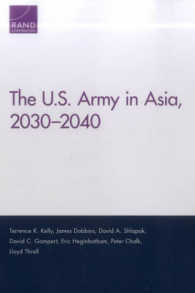- ホーム
- > 洋書
- > 英文書
- > Nature / Ecology
Full Description
This edited book covers various bioinoculants for sustainable crop production under the changing global climate. In addition, success stories and commercialization aspects are also discussed.
Growing environmental concerns related to climate change can potentially decrease the global yield capacity of agricultural systems.







